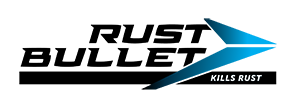Rust Bullet is proud to be a trusted partner in the industrial industry. No matter how harsh the environment, Rust Bullet offers coatings that provide optimum performance in the three main environments that are subjected to rust:
Atmospheric: A coating under atmosphere exposure must endure a variety of conditions, including heating, cooling, oxidation, wetting, and drying.
Immersion: Immersion coatings are primarily subjected to water solutions, ranging from pure water to high concentrations of various chemicals.
Underground Exposure: Coatings used in underground applications must be resistant to ground water and soil forces, so they are generally applied at a higher dry film thickness than atmospheric or immersion coatings.
Rust Bullet, LLC has provided rust coatings that work, reversing the rusting process for huge industrial buildings like the Delhi Metro Station Cooling Towers, the Industrial Tank Farm, Ghana, Africa, and many other huge structures that depend on Rust Bullet to perform properly.
The Industrial Disease
The steel industry refers to rust as the ‘cancer of steel.’ Our rust control products from Rust Bullet not only stop rust in its tracks, but reverse it. It KILLS rust. We have revolutionized the industrial industry’s battle against corrosion with a simple, one-step application, no prep, and low maintenance.
Evidence of the large indirect corrosion costs are lost time, and thus lost productivity because of outages, delays, failures, and litigation. Indirect costs are often ignored because only the direct costs are paid by the owner/operator.
It is known that the corrosion of metal structures has a significant impact on the U.S. economy, including infrastructure, transportation, utilities, production and manufacturing, and government. A 1975-benchmark study by Battelle-NBS calculated the cost of corrosion to be $70 billion per year, which was 4.2 percent of the nation’s gross national product (GNP).
Better corrosion management can be achieved using preventive strategies at every level of involvement (owner, operator, user, government, Federal regulators, and general public). This report will be of interest to government regulators and policy makers involved in materials-related issues, the general public, and practicing engineers concerned with materials of construction and process design.
